Accusation
Whatever name you call yourself in your own mind – simpleton, weakling… – never dare to do so without adding, “God loves simpletons.” or “God loves weaklings.” etc. The accusation of the Enemy and self-accusation differ in this regard.
Inner Counsels, Confessions, & Petitions
Whatever name you call yourself in your own mind – simpleton, weakling… – never dare to do so without adding, “God loves simpletons.” or “God loves weaklings.” etc. The accusation of the Enemy and self-accusation differ in this regard.
 Welcome is Prayer.
Welcome is Prayer.
The other night I went to hear a speaker at a local church, and they had me fill out a “visitor’s slip” for their database, and they expressed welcome both personally and corporately. They served an excellent meal. They had a renowned speaker. The priest introduced himself and took an interest. They seemed to go out of their way to make me feel welcome. But I didn’t feel welcome.
I felt like an outsider – somehow fundamentally outside the community. I felt like an outsider when prior to the lecture, they introduced the speaker, but there was no prayer. How does one share in listening, perhaps learning, without invoking the One it’s all for, and without whom it’s all vain? The speaker finished, and we were invited to eat, but there was no blessing of the food. Again, I felt outside – an outsider who had to say his prayers privately, as I do when I’m among the heterodox. Indeed, it felt a little like either I was heterodox, or they were. What had I done? Then the Q&A session began, again without prayer, so that we’re into a third hour without ever asking God’s help, his protection against passions, his guidance for our minds and ears, his strength against pride. And it quickly became an occasion for very uncomfortable comments that certainly were not fitting the piety of Holy Orthodoxy.
One can only hope that it ended with prayer; …
 This broke my heart today: “You who sit there in utter misery, look up and show your friend your face. There is no darkness bears a cloak so black as could conceal your suffering. Why wave your hand to warn me of the taint of blood? For fear your words pollute me? I am not afraid to share your deep affliction with you…” – Euripides (quoted here). Break my heart, Lord.
This broke my heart today: “You who sit there in utter misery, look up and show your friend your face. There is no darkness bears a cloak so black as could conceal your suffering. Why wave your hand to warn me of the taint of blood? For fear your words pollute me? I am not afraid to share your deep affliction with you…” – Euripides (quoted here). Break my heart, Lord.
As we begin Great Lent, giving alms to the poor from what we do not eat, be not afraid with me, friend.
From the same site, this excerpt from The Visionary by Rilke.
How little are the things with which we wrestle.
What with us wrestles, how much greater is!
If only we would let ourselves be conquered
as things are overcome by a great storm,
we would expand in space and need no names.
When we victorious are, it is over the small things,
and though we won, it leaves us feeling small.
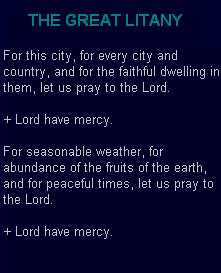 This is an entry in the comments of another article. It seems like it might also make a good article.
This is an entry in the comments of another article. It seems like it might also make a good article.
Each Winter stray cats starve and freeze to death in agonizing pain, whether in the country or in ordinary residential neighborhoods, right outside of abundant shelter and food. I always wanted to help, but I couldn’t think of the right way to do it, the correct way, the best way. So I did nothing. And that was more about my needs than the cats. I had it in the power of my hands with things lying around the garage or the house to deliver God’s creatures from torment, and I didn’t, and I am supposedly a Christian.
 This year, I was talking about it with my friend, and she said simply, “Don’t let obsession w. doing it perfectly keep you from doing anything. Do something.” First, I made one from a box and a towel – which is a very BAD cat house – even harmful. But then I decided that however long it took, this year, I’d do something, and do it well. I missed the first freeze from my absence of concern and attention, and I’ve no doubt some cats lost their lives. Then I researched feral cat houses online, and found that towels wick away body heat and get damp and cause hypothermia. And that there’s a right way to build inexpensive cat houses for strays and a whole community of people doing it. I built two of this kind. I got righteous, to use a surfer term. And the cats are using them.
This year, I was talking about it with my friend, and she said simply, “Don’t let obsession w. doing it perfectly keep you from doing anything. Do something.” First, I made one from a box and a towel – which is a very BAD cat house – even harmful. But then I decided that however long it took, this year, I’d do something, and do it well. I missed the first freeze from my absence of concern and attention, and I’ve no doubt some cats lost their lives. Then I researched feral cat houses online, and found that towels wick away body heat and get damp and cause hypothermia. And that there’s a right way to build inexpensive cat houses for strays and a whole community of people doing it. I built two of this kind. I got righteous, to use a surfer term. And the cats are using them.
 There’s a sin the fathers warn us of: “Gluttony of delicacy.” It is the sin of choosing not to pray or approach the holy things because of the dept of my sin, when in fact praying and returning to God is what would save me. It’s a form of despair. Overmuch (gluttony) of delicacy (the need to have it all just right – perfect – before I will act or do anything). It is a grievous sin.
There’s a sin the fathers warn us of: “Gluttony of delicacy.” It is the sin of choosing not to pray or approach the holy things because of the dept of my sin, when in fact praying and returning to God is what would save me. It’s a form of despair. Overmuch (gluttony) of delicacy (the need to have it all just right – perfect – before I will act or do anything). It is a grievous sin.
Writ against the world of loving others, how grievous and most grievous. That I would fail to give to the poor because I couldn’t be 100% certain they wouldn’t buy some booze, or because some of it might go to administrative costs, or what have you: I am guilty of that sin. I spent years not giving, because I couldn’t find the ‘right’ charity, and I was afraid of throwing my money down the toilet. …
I am guilty of that sin. I spent years not giving, because I couldn’t find the ‘right’ charity, and I was afraid of throwing my money down the toilet. …
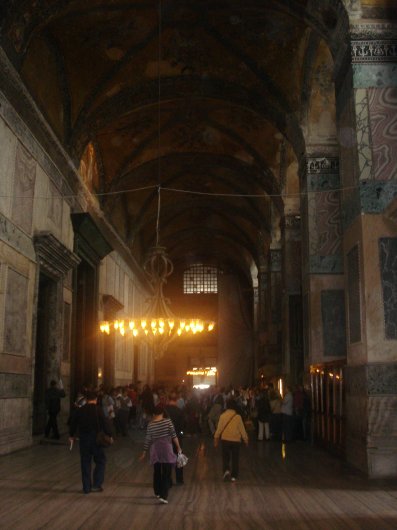 I have spent most of my younger Orthodox life being most concerned about offending God. Myself offending God. Others offending God. My people (us) offending God.
I have spent most of my younger Orthodox life being most concerned about offending God. Myself offending God. Others offending God. My people (us) offending God.
I’ve begun to think that God is most offended by how men act toward one another. Most offended by failure to love one another. By my failure. In other words, it is the offenses I commit against others that are the most grievous – not offenses against God per se. There’s no dichotomy, of course, for the one thing is the other. “Against Thee only have I sinned.” But it seems that failure to love one another is the worst sin.
I don’t mean philosophical or psychological love – how we think or feel about each other in theory or apart from action. It is so common to hold up philosophical “love” or mere warmth as superior to all, and claim that this is what Christ taught. Such an approach dismisses the fathers, who think quite differently. St. Photius, for example, said the highest form of love is to tell the truth. Something similar, I believe, was said by St. Maximus.
 So often, “love”, philosophical love, is held up in dichotomy with whatever the speaker doesn’t like. If you want to discuss getting rid of the pews and the organ, invariably someone will say “love is the most important thing.” If you want to talk of our obligations to fast and pray, you’ll hear “love is over all.” Usually, this is just a way of dismissing any unwanted or unliked discussion or suggestion, and represents an unanswerable superiority. It’s what logicians call a “thought terminating cliche” – a cliche that quells thought itself. In short, it’s talking of love without having love. It’s idle talk. Theory. The presumption is that this vision of love is something the speaker has, or knows of, and so is somehow elevated above the things that concern others, above the conversation.
So often, “love”, philosophical love, is held up in dichotomy with whatever the speaker doesn’t like. If you want to discuss getting rid of the pews and the organ, invariably someone will say “love is the most important thing.” If you want to talk of our obligations to fast and pray, you’ll hear “love is over all.” Usually, this is just a way of dismissing any unwanted or unliked discussion or suggestion, and represents an unanswerable superiority. It’s what logicians call a “thought terminating cliche” – a cliche that quells thought itself. In short, it’s talking of love without having love. It’s idle talk. Theory. The presumption is that this vision of love is something the speaker has, or knows of, and so is somehow elevated above the things that concern others, above the conversation.
But this is precisely not the kind of “love” or love-talk that I mean. I mean how one actually treats other people, including in those moments. Am I superior, or do I take the path of being inferior, as the Fathers teach? I am beginning to think that the biggest concern that God has expressed in the scriptures, in the liturgy, and in the consensus of our Fathers, is for how we treat one another – whether with kindness or mere civility, simple generosity or jealousy. He seems to forgive all manner of offenses against him, but stresses loving one another, and is much harder on those offenses.
I mean nothing especially profound, here. And I am still concerned about offenses against God. But I am beginning, I think, to shift, weighing things a little differently. It is much better that my brother offend God, than that I offend God even more by scorn in my heart for my brother.
 The liturgy says, “With fear of God, with faith and love draw near”. Some enterprising revisionists have expurgated the word ‘fear’, not understanding it, or sharing the Faith of our fathers who prayed this, and saved themselves, and then led us to the Faith. One writer has said, in true Orthodox fashion, that these correspond not only to the psychology of fear, faith, and love, but to the parts of the temple as well as to progress in Orthodoxy. Fear corresponds to the outer part of the temple, the narthex, and to the beginning of Christianity, by which we learn reverence, respect, awe, honor, the height of God and depth of our sin. And we never lose this, if we remain faithful. Faith represents the inner part of the temple, the nave, and standing with the faithful, confessing the true doctrines of the Church and singing true prayers. Love represents the chalice itself, the altar, and our approaching it, keeping in mind the prayers of access that we say (“that with boldness and without condemnation”), and the fullness of life in Christ and therefore life with each other – the peace with God that brings peace among all men.
The liturgy says, “With fear of God, with faith and love draw near”. Some enterprising revisionists have expurgated the word ‘fear’, not understanding it, or sharing the Faith of our fathers who prayed this, and saved themselves, and then led us to the Faith. One writer has said, in true Orthodox fashion, that these correspond not only to the psychology of fear, faith, and love, but to the parts of the temple as well as to progress in Orthodoxy. Fear corresponds to the outer part of the temple, the narthex, and to the beginning of Christianity, by which we learn reverence, respect, awe, honor, the height of God and depth of our sin. And we never lose this, if we remain faithful. Faith represents the inner part of the temple, the nave, and standing with the faithful, confessing the true doctrines of the Church and singing true prayers. Love represents the chalice itself, the altar, and our approaching it, keeping in mind the prayers of access that we say (“that with boldness and without condemnation”), and the fullness of life in Christ and therefore life with each other – the peace with God that brings peace among all men.
I seem to be making a little progress.
 How imperfect the union of all men, that we pray for in the litanies.
How imperfect the union of all men, that we pray for in the litanies.
Death, the fragmentation that sunders body and soul, that divides the soul (setting mind, will, and emotion at odds) also divides us from all men.
The first criminal psychologists were called Alienists, because they believed that behavior which alienates men from each other stems from an inner alienation from the self.
Death at work in my members. Death, the universal foe and inheritance from Adam.
Wherever there is sickness, it is death. Wherever hurt or want. Wherever frustration or deprivation. Wherever pain and suffering.
All these things in the world come from this one disease, spread even to creation, alienating man from environment, and all creatures from each other – caught as they are now in the struggle of the jungle – killing or being killed or starving, so that all creation groans, waiting for the full revelation of our triumph, the fullness of victory, the taking by persons of what is won by nature. As scripture puts it, “the revelation of the sons of God” to the world.
And then, beloved, the lion will lie down with the lamb, and a little child shall lead them. We shall all be restored to ourselves and each other. We shall be whole, and neither shall there be known any more sickness, or sorrow, or sighing, or hunger, or hatred, and neither shall man make war.
It is coming, my brother, my sister. Until then, how imperfect this union. And yet, we shall persevere until then, by Christ who has redeemed our nature from the grave, and makes possible the union of each person with him. What they could not do at Babel, Christ has done in his own person, through the Theotokos.

May the Lord answer in time of trial;
may the name of Jacob’s God protect you.
May he send you help from his shrine
and give you support from Zion.
May he remember all your offerings
and receive your sacrifice with favor.
May he give you your heart’s desire
and fulfill every one of your plans.
May we ring out our joy at your victory
and rejoice in the name of our God.
May the Lord grant all your prayers.
I am sure now that the Lord
will give victory to his anointed,
will reply from his holy heaven
with the mighty victory of his hand.
Some trust in chariots or horses,
but we in the name of the Lord.
They will collapse and fall,
but we shall hold and stand firm.
Give victory to the king, O Lord,
give answer on the day we call.
Glory be to the Father, and to the Son, and to the Holy Spirit;
as it was in the beginning, is now, and ever shall be. Amen
– Psalm 19 Greek (20 Hebrew). –
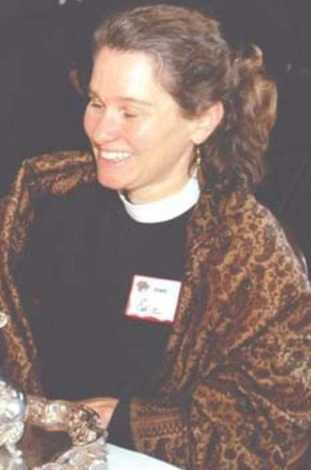 I once had a spiritual advisor, Edie, and among the things that she helped me with was this: I was starting to lose heart, because I was poor. The people around me had been saying that it’s a sign of God’s judgment on me, and that I should be ashamed because I couldn’t pay my bills, and was in debt, and had to pay late fees all the time. It’s so easy for the poor to become demoralized about being poor, but especially when the people of God are against you. But Edie gave the scriptures back to me. She read the Gospel to me and asked me, “Who are the poor?” Then she answered, “They are those who cannot pay their bills, who are in debt, and who have to pay interest and penalties all the time. It was this way even when Christ walked among the poor.” She added, “you cannot despise yourself for being poor, because then you would be despising the very thing that Christ does not despise. And as for judgment, it is those who despise the poor that Christ said he would judge. So love the poor, and be poor, and don’t despise anyone, and be saved.”
I once had a spiritual advisor, Edie, and among the things that she helped me with was this: I was starting to lose heart, because I was poor. The people around me had been saying that it’s a sign of God’s judgment on me, and that I should be ashamed because I couldn’t pay my bills, and was in debt, and had to pay late fees all the time. It’s so easy for the poor to become demoralized about being poor, but especially when the people of God are against you. But Edie gave the scriptures back to me. She read the Gospel to me and asked me, “Who are the poor?” Then she answered, “They are those who cannot pay their bills, who are in debt, and who have to pay interest and penalties all the time. It was this way even when Christ walked among the poor.” She added, “you cannot despise yourself for being poor, because then you would be despising the very thing that Christ does not despise. And as for judgment, it is those who despise the poor that Christ said he would judge. So love the poor, and be poor, and don’t despise anyone, and be saved.”
 Over the years, I began to hear another luminary, Tony Campolo. He showed me how I live in the wealthiest nation in the world, or at least the most gluttonous, even if it is really on borrowed loot. “You know and I know that most of what we spend in any given year is spent on stuff that we don’t need.” Campolo showed me my poverty as riches compared to the truly poor of the world. I have always been able to eat, but there are mothers watching their children wither in their arms and their whole families die, because they cannot even find water. Here, it would be hard to find a poor dwelling without cable TV. Others in the world can’t even imagine owning something so valuable as a TV; an inexpensive one here would feed a family there for a year.
Over the years, I began to hear another luminary, Tony Campolo. He showed me how I live in the wealthiest nation in the world, or at least the most gluttonous, even if it is really on borrowed loot. “You know and I know that most of what we spend in any given year is spent on stuff that we don’t need.” Campolo showed me my poverty as riches compared to the truly poor of the world. I have always been able to eat, but there are mothers watching their children wither in their arms and their whole families die, because they cannot even find water. Here, it would be hard to find a poor dwelling without cable TV. Others in the world can’t even imagine owning something so valuable as a TV; an inexpensive one here would feed a family there for a year.
 Then eventually, I began again to listen to the Gospel itself, with ears unstuck, and I could hear Christ. I don’t mean any kind of ecstatic vision. I mean I could hear the simple words and see them in the present. And that’s when I realized that the poor are not only the hungry. They are those deprived of friendship or status (the stranger), of peace and comfort (the afflicted), of refuge (the naked and homeless). They are all those everywhere who want of grace, of the grace it has been given us to give them. The poor are covered with sores. They are the man of the tombs. They are the born blind and held in institutions. They are the abandoned spouse – the widow. The unwanted child – the orphan. The immigrant. They are those with a demon, the mentally ill, antisocial, illegal, hunted, turned against themselves and all men. And it is ever to the poor that Christ goes, ever with them that he concerns himself. I can hear Campolo say, “And you can’t be a Christian, unless you do likewise.” I can hear Edie say, “woe to those who despise the poor.” I can hear Christ, “inasmuch as ye have done it to the very least of all these – these my brethren…”
Then eventually, I began again to listen to the Gospel itself, with ears unstuck, and I could hear Christ. I don’t mean any kind of ecstatic vision. I mean I could hear the simple words and see them in the present. And that’s when I realized that the poor are not only the hungry. They are those deprived of friendship or status (the stranger), of peace and comfort (the afflicted), of refuge (the naked and homeless). They are all those everywhere who want of grace, of the grace it has been given us to give them. The poor are covered with sores. They are the man of the tombs. They are the born blind and held in institutions. They are the abandoned spouse – the widow. The unwanted child – the orphan. The immigrant. They are those with a demon, the mentally ill, antisocial, illegal, hunted, turned against themselves and all men. And it is ever to the poor that Christ goes, ever with them that he concerns himself. I can hear Campolo say, “And you can’t be a Christian, unless you do likewise.” I can hear Edie say, “woe to those who despise the poor.” I can hear Christ, “inasmuch as ye have done it to the very least of all these – these my brethren…”
I look now on the emptiness of my years, the meaninglessness of what I have spent so much of myself upon, since that is the currency for which even the ‘poor’ man can give account. I have been given the riches of my life, the abundance of my temporal existence. On what have I spent such wealth? And isn’t it that, my very existence, I threaten to forfeit in the Judgment?
That’s when I hear Campolo again, saying, “He condemns people like me with words like these, for I hear him echoing down through the corridors of time: ‘it is harder for a rich man to enter the kingdom of heaven than for a camel to go through the eye of a needle.”
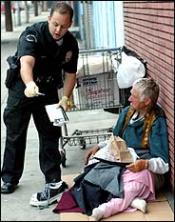 A few years ago, in a nearby college town, I saw police hassling a homeless person who was also probably a little emotionally sick. He’d been sitting on a bench with his gear outside some businesses in the campus area. Apparently someone had decided he was talking to himself too loudly and called 911.”I didn’t do anything,” he said. One of the officers replied, “Do you want us to find something to arrest you for?” Yes, they offered to just make something up – to falsely accuse the man, something I’ve seen more than once.
A few years ago, in a nearby college town, I saw police hassling a homeless person who was also probably a little emotionally sick. He’d been sitting on a bench with his gear outside some businesses in the campus area. Apparently someone had decided he was talking to himself too loudly and called 911.”I didn’t do anything,” he said. One of the officers replied, “Do you want us to find something to arrest you for?” Yes, they offered to just make something up – to falsely accuse the man, something I’ve seen more than once.
 Tonight on our local city channel is a piece about a new ordinance aimed at panhandlers. The police spokesman said it’s only aimed at “aggressive panhandling” not at the free speech protections accorded panhandlers. It became clear quickly that the opposite was true, when he described twelve definitions of “aggressive pandhandling”. These include asking for charity too close to a phone booth, or too close to sundown, or to anyone waiting in line for a show or any other kind of line, or asking more than once, or ‘following’ a person so you can ask them for charity. Between the twelve ways to mess it up, there’s really no place to stand and no way to ask. What’s worse, it’s designed so the accuser is presumed truthful. We’re told, we “have the right to write out a citation, and have the individual arrested.” In short, they’ve made it impossible for the poor (and these are the poor among us) to survive.
Tonight on our local city channel is a piece about a new ordinance aimed at panhandlers. The police spokesman said it’s only aimed at “aggressive panhandling” not at the free speech protections accorded panhandlers. It became clear quickly that the opposite was true, when he described twelve definitions of “aggressive pandhandling”. These include asking for charity too close to a phone booth, or too close to sundown, or to anyone waiting in line for a show or any other kind of line, or asking more than once, or ‘following’ a person so you can ask them for charity. Between the twelve ways to mess it up, there’s really no place to stand and no way to ask. What’s worse, it’s designed so the accuser is presumed truthful. We’re told, we “have the right to write out a citation, and have the individual arrested.” In short, they’ve made it impossible for the poor (and these are the poor among us) to survive.
Looking on these things, I am reminded that the only people who will not go into everlasting fire – not Hell, mind you, but the eternal torment – are those who care for the poor:
 “Then shall he say also unto them on the left hand, Depart from me, ye cursed, into everlasting fire, prepared for the devil and his angels: For I was hungry, and ye gave me no meat: I was thirsty, and ye gave me no drink: I was a stranger, and ye took me not in: naked, and ye clothed me not: sick, and in prison, and ye visited me not.”
“Then shall he say also unto them on the left hand, Depart from me, ye cursed, into everlasting fire, prepared for the devil and his angels: For I was hungry, and ye gave me no meat: I was thirsty, and ye gave me no drink: I was a stranger, and ye took me not in: naked, and ye clothed me not: sick, and in prison, and ye visited me not.”
The rod of iron cometh. “Do we not now reck his rod?” Each knee begins to bow, and each tongue confess. Despite the pride. Despite the greed and self-worship. Can you feel the Judgment coming soon? And the answer that must be given?
“And out of his mouth goeth a sharp sword, that with it he should smite the nations: and he shall rule them with a rod of iron: and he treadeth the winepress of the fierceness and wrath of Almighty God.”
Lord have mercy. And beyond this, it is difficult to say anything. We each know what we have done or have not done. We know where our treasure is, or where it has not been. Who can really answer for anyone but himself? I only know this; the Judgment is coming. It hastens. It is closer now, and closer, every day. And I am an unrighteous man.
 At the Dazzling Stone Orphanage in India, little children send up their prayers for people who bring them soap or toothpaste, or rice, or nutrient drinks. Can you imagine this? Those little voices, going forth to God… “Have mercy on Mr. Smith, who gave us a meal. On Mrs. Jones, who gave us some clean towels. On … ” Who will cry out for me, I wonder? Will any voice be heard?
At the Dazzling Stone Orphanage in India, little children send up their prayers for people who bring them soap or toothpaste, or rice, or nutrient drinks. Can you imagine this? Those little voices, going forth to God… “Have mercy on Mr. Smith, who gave us a meal. On Mrs. Jones, who gave us some clean towels. On … ” Who will cry out for me, I wonder? Will any voice be heard?
How much I crave now the prayers of those ones, those few small voices, so very few, for whom I have given so much less than a tithe, so much less than alms, less even than I spend on cups of coffee. How I want the riches of their prayers for my salvation, so that someone will bear witness on my behalf in the Judgment. And I can barely imagine the voices of those who will cry out that I could have helped them and did not. I haven’t learned their voices, and I haven’t asked their prayers. They are unknown to me, and cry from the ground.
Click photos for source. Fair use.
 “Although by katchi abadi standards, Grax is better than many others, the village has many social, physical and civic deprivations. During one of our visits, the community health worker expressed concern about a girl who appeared ‘mentally disturbed’. She lived about a mile from the centre. We went to visit her at her house.
“Although by katchi abadi standards, Grax is better than many others, the village has many social, physical and civic deprivations. During one of our visits, the community health worker expressed concern about a girl who appeared ‘mentally disturbed’. She lived about a mile from the centre. We went to visit her at her house.
A small cordoned-off area with two small rooms, a small area for the kitchen and a toilet with open drains constituted the ‘house’ of 75 square yards, perhaps a little more. The father of the girl was unemployed, the elder brother suffering from some sort of ‘mental imbalance’. A number of semi-clad children were milling about — presumably brothers and sisters. Their only source of income was a buffalo.
The health worker was right. The girl did appear unwell, “for the past three years,” her mother told us, “since the birth of her son”. He died a month after being born. The girl talked to imaginary voices, was frightened of others, and laughed to herself. She had run out of the house many times. Unable to afford medicines or have her treated on a regular basis, the family kept her tied to a tree. The result: badly infected wounds with pus and blood oozing out from both ankles.
Long abandoned by her husband — older than her by many years — she now lay on straw matting in the corner of one of the two small rooms, oblivious to her surroundings. She appeared not to have had a wash in weeks. I tried to engage her in conversation but she looked past me, and I was unable to penetrate her secret world. I asked the mother the girl’s age. “Fifteen…,” she said; the words echoed in my ears.” — [Dawn]
Mercy, light, peace, deliverance for the unnamed child.
 The Fast is coming. Can you feel it? The world is bending into leanness. The creation is a mystery. How we shun the first buds of Spring for the fullness of Spring, and prepare ourselves. The Fast is coming. At last, at last. Time that we can turn ourselves more fully into repentance, time we can more fully give ourselves to the poor, time we can strip ourselves down of weights and fatness until the Day dawns.
The Fast is coming. Can you feel it? The world is bending into leanness. The creation is a mystery. How we shun the first buds of Spring for the fullness of Spring, and prepare ourselves. The Fast is coming. At last, at last. Time that we can turn ourselves more fully into repentance, time we can more fully give ourselves to the poor, time we can strip ourselves down of weights and fatness until the Day dawns.
I do not yet look for the Resurrection. First, I look for Death to work its course. First, the darkness. First the season of shadows and lamentation, of weeping over sins. Golgotha first. The place of skulls. Advancing toward the city to die.
 I like Kafka. His treatment of the world is that of reductio ad absurdum. I find a lot of people, with a sort of evangelical framework, can’t understand my feeling at home in such things. Kafka gives us the world in its injustice, but reduces it to its utter mindlessness, its senility, its deprivation of meaning. In that sense, he writes like the Saints. Where is the splendor of the world? Is it the Castle? Where is the justice of the world? Is it the Trial? Where is the meaning? In its industry, that metamorphoses a man into a creature at once of hive and of utter alienation from himself? Scorn. Derision. Ridicule. Contempt. This is our response to the world. So Kafka, and those like him, feel very much like home to me. Those at home in the world would call this depression. Even the religious people who are ever seeking a normalcy in that realm, rather than in the morbid lair of the Saints, the inner castle, the self trying of self, the willing alienation from the flesh. I don’t know what to say to them. Like Kafka’s bug, I’m afraid it just comes out as growling, and makes them want to close the door and pretend not to have heard.
I like Kafka. His treatment of the world is that of reductio ad absurdum. I find a lot of people, with a sort of evangelical framework, can’t understand my feeling at home in such things. Kafka gives us the world in its injustice, but reduces it to its utter mindlessness, its senility, its deprivation of meaning. In that sense, he writes like the Saints. Where is the splendor of the world? Is it the Castle? Where is the justice of the world? Is it the Trial? Where is the meaning? In its industry, that metamorphoses a man into a creature at once of hive and of utter alienation from himself? Scorn. Derision. Ridicule. Contempt. This is our response to the world. So Kafka, and those like him, feel very much like home to me. Those at home in the world would call this depression. Even the religious people who are ever seeking a normalcy in that realm, rather than in the morbid lair of the Saints, the inner castle, the self trying of self, the willing alienation from the flesh. I don’t know what to say to them. Like Kafka’s bug, I’m afraid it just comes out as growling, and makes them want to close the door and pretend not to have heard.
“Beguiling and deceptive is the life of the world, fruitless its labor, perilous its delight, poor its riches, delusive its honors, inconstant, insignificant; and woe to those who hope in its seeming goods: because of this many die without repentance. Blessed and most blessed are those who depart from the world and its desires.” — Elder Nazarius
Image from [webcomicsnation]
Fundamental religious questions. Where I’ve been, and where I am going.
| Ultimate Questions | Protestant |
Anglican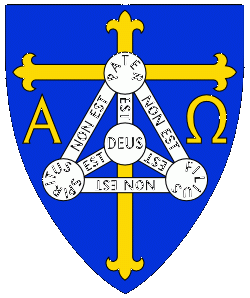 |
Orthodox |
| Who am I? | A Christian | * A Sinner * Dust |
The Sinner |
| Who are others? | Needing salvation | Brothers | * Superior * “By their prayers save me.” * “All shall be saved, I alone condemned.” |
| Why am I here? | For Salvation | For Life | For Repentance |
| How should I live? | Scripturally | * Morally * Ethically |
Theosis (Union w. God) |
| Where are we in history or time? | The End Times | The Age of the Church | * The Last Days of Christ’s Economy. * Christ’s Millenial Reign * The Eighth Day of Creation |
| Why do we suffer? | Sin (one’s own) | * Sin (the world’s) * Grace |
Death |
I don’t wish to be unfair to the fullness of Protestant or Anglican psychology, so I’ll say that my own view is coloured by looking at it in retrospect, and by perhaps inadequate understanding at the time. This represents then, not so much a commentary on each individual confession, but a personal progression. One may contrast each of the columns, however, with a column for Nihilism in which there are no answers to ultimate questions. The Orthodox column, also, is properly seen not as an either/or exclusion of the others, but a both/and. In other words, the other columns are assumed in the fullness of Orthodoxy. If I wanted to go farther, perhaps a comparison of theology and piety: …

I believe that, when we do spiritual combat, we are escorted by angels. It is just like this, except the banners are more numerous than stars, and the hermits are surrounding us with prayers, but there is always the cross, “invincible weapon, adversary of demons, glory of martyrs, true ornament of holy monks.” It is our claymore.
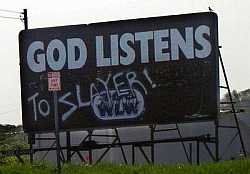 I came across an “Orthodox” blog that had these rules: no hate speech, no obscenities, no anti-religious comments, no sacreligious images. It’s awfully tempting, but no, I didn’t post anything. But I thought about posting one word: GOD. It is all these things to someone, in some way. It is hate speech: “I abhor the pride of Jacob, and hate his palaces.” It’s obscene in most environments, especially religious ones, precisely because it’s anti-religious. And it’s a sacreligious image, when we see the word and think we know what it means – when it is a concept.
I came across an “Orthodox” blog that had these rules: no hate speech, no obscenities, no anti-religious comments, no sacreligious images. It’s awfully tempting, but no, I didn’t post anything. But I thought about posting one word: GOD. It is all these things to someone, in some way. It is hate speech: “I abhor the pride of Jacob, and hate his palaces.” It’s obscene in most environments, especially religious ones, precisely because it’s anti-religious. And it’s a sacreligious image, when we see the word and think we know what it means – when it is a concept.
The word GOD is not a name, but a word that stands for “we don’t know”. It is the recognition that incomprehensible, unknowable, without analogy or comparison, something exists but only in the sense that we do not, or else we exist in a way that God does not. The word GOD is a recognition of our unknowing, and so does not refer to anything, not really, except by means of a miracle. May GOD remove from our minds all false images.
I was tempted to leave that one-word comment, but I’m not a very bad man. I only thought about it. I was good, and left their comment section as godless as I found it. 🙂